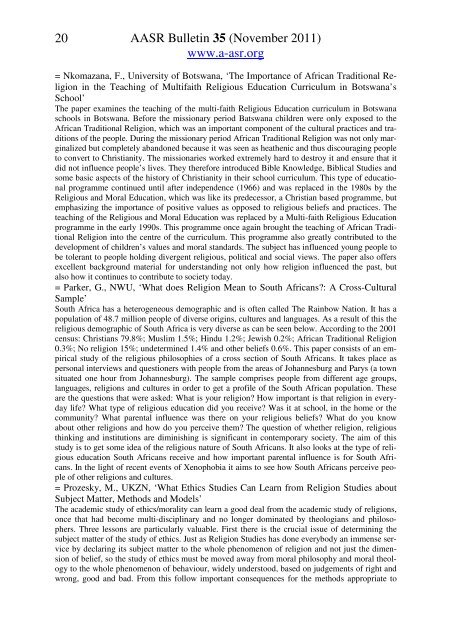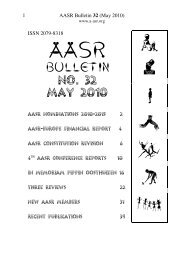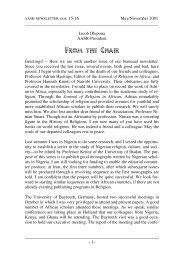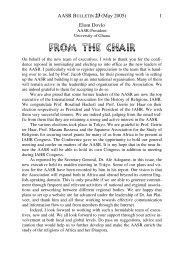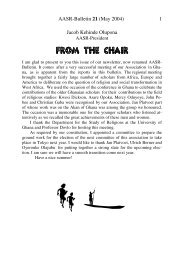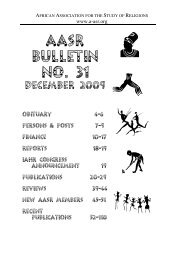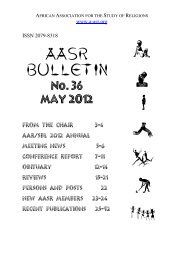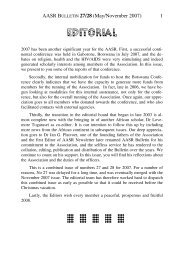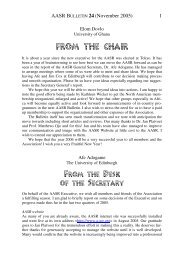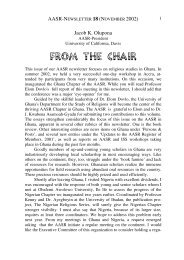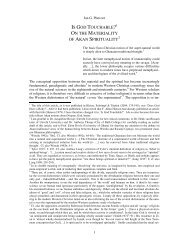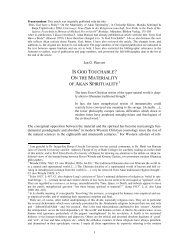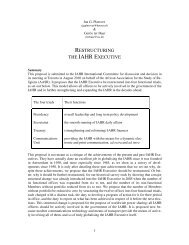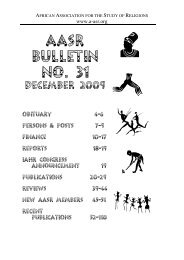AASR Bulletin 35 - The African Association for the Study of Religions
AASR Bulletin 35 - The African Association for the Study of Religions
AASR Bulletin 35 - The African Association for the Study of Religions
Create successful ePaper yourself
Turn your PDF publications into a flip-book with our unique Google optimized e-Paper software.
20<br />
<strong>AASR</strong> <strong>Bulletin</strong> <strong>35</strong> (November 2011)<br />
www.a-asr.org<br />
= Nkomazana, F., University <strong>of</strong> Botswana, ‘<strong>The</strong> Importance <strong>of</strong> <strong>African</strong> Traditional Religion<br />
in <strong>the</strong> Teaching <strong>of</strong> Multifaith Religious Education Curriculum in Botswana’s<br />
School’<br />
<strong>The</strong> paper examines <strong>the</strong> teaching <strong>of</strong> <strong>the</strong> multi-faith Religious Education curriculum in Botswana<br />
schools in Botswana. Be<strong>for</strong>e <strong>the</strong> missionary period Batswana children were only exposed to <strong>the</strong><br />
<strong>African</strong> Traditional Religion, which was an important component <strong>of</strong> <strong>the</strong> cultural practices and traditions<br />
<strong>of</strong> <strong>the</strong> people. During <strong>the</strong> missionary period <strong>African</strong> Traditional Religion was not only marginalized<br />
but completely abandoned because it was seen as hea<strong>the</strong>nic and thus discouraging people<br />
to convert to Christianity. <strong>The</strong> missionaries worked extremely hard to destroy it and ensure that it<br />
did not influence people’s lives. <strong>The</strong>y <strong>the</strong>re<strong>for</strong>e introduced Bible Knowledge, Biblical Studies and<br />
some basic aspects <strong>of</strong> <strong>the</strong> history <strong>of</strong> Christianity in <strong>the</strong>ir school curriculum. This type <strong>of</strong> educational<br />
programme continued until after independence (1966) and was replaced in <strong>the</strong> 1980s by <strong>the</strong><br />
Religious and Moral Education, which was like its predecessor, a Christian based programme, but<br />
emphasizing <strong>the</strong> importance <strong>of</strong> positive values as opposed to religious beliefs and practices. <strong>The</strong><br />
teaching <strong>of</strong> <strong>the</strong> Religious and Moral Education was replaced by a Multi-faith Religious Education<br />
programme in <strong>the</strong> early 1990s. This programme once again brought <strong>the</strong> teaching <strong>of</strong> <strong>African</strong> Traditional<br />
Religion into <strong>the</strong> centre <strong>of</strong> <strong>the</strong> curriculum. This programme also greatly contributed to <strong>the</strong><br />
development <strong>of</strong> children’s values and moral standards. <strong>The</strong> subject has influenced young people to<br />
be tolerant to people holding divergent religious, political and social views. <strong>The</strong> paper also <strong>of</strong>fers<br />
excellent background material <strong>for</strong> understanding not only how religion influenced <strong>the</strong> past, but<br />
also how it continues to contribute to society today.<br />
= Parker, G., NWU, ‘What does Religion Mean to South <strong>African</strong>s: A Cross-Cultural<br />
Sample’<br />
South Africa has a heterogeneous demographic and is <strong>of</strong>ten called <strong>The</strong> Rainbow Nation. It has a<br />
population <strong>of</strong> 48.7 million people <strong>of</strong> diverse origins, cultures and languages. As a result <strong>of</strong> this <strong>the</strong><br />
religious demographic <strong>of</strong> South Africa is very diverse as can be seen below. According to <strong>the</strong> 2001<br />
census: Christians 79.8%; Muslim 1.5%; Hindu 1.2%; Jewish 0.2%; <strong>African</strong> Traditional Religion<br />
0.3%; No religion 15%; undetermined 1.4% and o<strong>the</strong>r beliefs 0.6%. This paper consists <strong>of</strong> an empirical<br />
study <strong>of</strong> <strong>the</strong> religious philosophies <strong>of</strong> a cross section <strong>of</strong> South <strong>African</strong>s. It takes place as<br />
personal interviews and questioners with people from <strong>the</strong> areas <strong>of</strong> Johannesburg and Parys (a town<br />
situated one hour from Johannesburg). <strong>The</strong> sample comprises people from different age groups,<br />
languages, religions and cultures in order to get a pr<strong>of</strong>ile <strong>of</strong> <strong>the</strong> South <strong>African</strong> population. <strong>The</strong>se<br />
are <strong>the</strong> questions that were asked: What is your religion How important is that religion in everyday<br />
life What type <strong>of</strong> religious education did you receive Was it at school, in <strong>the</strong> home or <strong>the</strong><br />
community What parental influence was <strong>the</strong>re on your religious beliefs What do you know<br />
about o<strong>the</strong>r religions and how do you perceive <strong>the</strong>m <strong>The</strong> question <strong>of</strong> whe<strong>the</strong>r religion, religious<br />
thinking and institutions are diminishing is significant in contemporary society. <strong>The</strong> aim <strong>of</strong> this<br />
study is to get some idea <strong>of</strong> <strong>the</strong> religious nature <strong>of</strong> South <strong>African</strong>s. It also looks at <strong>the</strong> type <strong>of</strong> religious<br />
education South <strong>African</strong>s receive and how important parental influence is <strong>for</strong> South <strong>African</strong>s.<br />
In <strong>the</strong> light <strong>of</strong> recent events <strong>of</strong> Xenophobia it aims to see how South <strong>African</strong>s perceive people<br />
<strong>of</strong> o<strong>the</strong>r religions and cultures.<br />
= Prozesky, M., UKZN, ‘What Ethics Studies Can Learn from Religion Studies about<br />
Subject Matter, Methods and Models’<br />
<strong>The</strong> academic study <strong>of</strong> ethics/morality can learn a good deal from <strong>the</strong> academic study <strong>of</strong> religions,<br />
once that had become multi-disciplinary and no longer dominated by <strong>the</strong>ologians and philosophers.<br />
Three lessons are particularly valuable. First <strong>the</strong>re is <strong>the</strong> crucial issue <strong>of</strong> determining <strong>the</strong><br />
subject matter <strong>of</strong> <strong>the</strong> study <strong>of</strong> ethics. Just as Religion Studies has done everybody an immense service<br />
by declaring its subject matter to <strong>the</strong> whole phenomenon <strong>of</strong> religion and not just <strong>the</strong> dimension<br />
<strong>of</strong> belief, so <strong>the</strong> study <strong>of</strong> ethics must be moved away from moral philosophy and moral <strong>the</strong>ology<br />
to <strong>the</strong> whole phenomenon <strong>of</strong> behaviour, widely understood, based on judgements <strong>of</strong> right and<br />
wrong, good and bad. From this follow important consequences <strong>for</strong> <strong>the</strong> methods appropriate to


